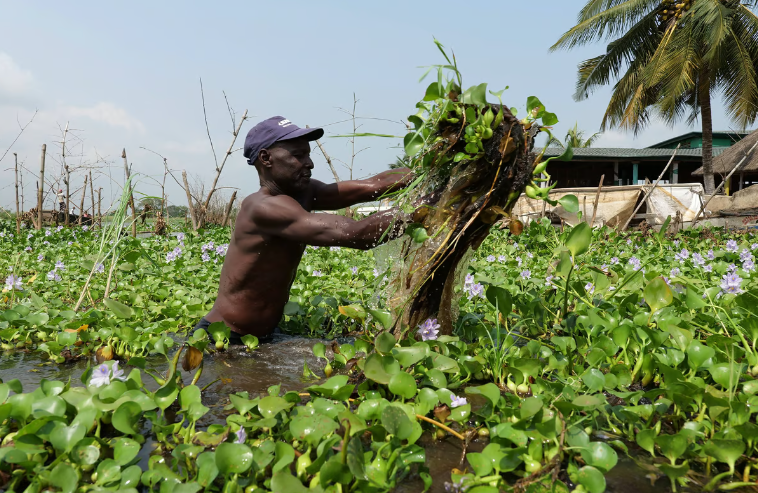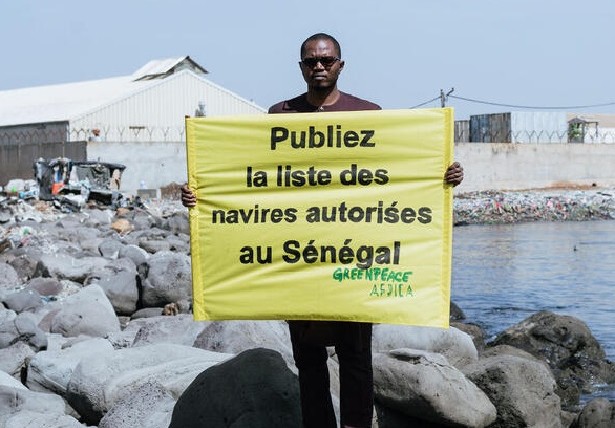This plant is listed among the 100 most invasive species in the world. Faced with such a threat to the biodiversity of African lakes, some are trying to curb its proliferation while also using it to fight other forms of pollution.
Every week, fishermen on Lake Naivasha in Kenya get to work. And they don’t just fish for fish. Their Sisyphean task is a battle against a plant that destroys as much as it blooms: the water hyacinth. Don’t be fooled by the beauty of its purple flowers. This floating aquatic plant is actually one of the 100 most invasive species in the world. Eichhornia crassipes – its Latin name – originally from South America, has conquered African lake ecosystems in just a few decades.
Its spread, exacerbated by the impacts of climate change, can also be explained by other forms of pollution. The discharge of chemical fertilizers linked to Kenya’s massive horticultural production coincides with the unchecked growth of water hyacinth. A true threat to fish and, by extension, the sustainability of the fishing industry, the plant’s stolons carpet the lakes, saturate the waters, and deplete oxygen (a process known as eutrophication), which also hinders fishermen’s access. Its proliferation encourages the spread of parasites that carry diseases, while its decomposition results in greenhouse gas emissions. More than twenty African countries are affected by this devastating invasion, from Lake Naivasha, through Lake Nokoué in Benin, to Lake Tana in Ethiopia.

Its patented biodegradable packaging is used to produce seed packets for large-scale replantation nurseries in Kenya, as well as food packaging. The country aims to combat the harmful effects of deforestation with the goal of planting 15 billion trees by 2032. At the same time, « plastic bags have been banned in Kenya, » reminds Joseph Nguthiru. « This law is useful in fighting plastic pollution. However, it has left a gap, and we are trying to address it with a sustainable solution. »

In this field, the Kenyan company does not hold a monopoly on ingenuity. In Benin, water hyacinth is transformed into a fiber that absorbs liquid pollutants. These anti-pollutant sachets, called GKsorb, are also recycled by the same company that produces them, Green Keeper Africa. The plant is capable of absorbing up to ten times its weight in hydrocarbons. Other uses are possible: in Benin, the NGO Jevev unites the people of the Ouémé Valley around transforming hyacinth into natural compost.
In the DRC, the inhabitants of the shores of Lake Tanganyika didn’t wait for the arrival of startups to use both green and dry. Water hyacinth is used in the artisanal creation of baskets, hats, and necklaces. This decorative use is also developed by the company Hyacinth Art House on the other side of the lake, in Burundi. In a study dedicated to solutions for invasive species, the Network for Biodiversity and Ecosystem Services notes the numerous « economic opportunities linked to transforming invasive species into valuable products. » However, they also warn against the risks: « Scientific support and training for local communities are necessary to ensure that the harvesting and transformation of the plant are done sustainably, to avoid exacerbating the environmental problems caused by its proliferation. »
——-
Ahead of the Change Now Summit, which will take place in Paris from April 24 to 26, 2025, and of which Jeune Afrique Media Group is a partner, we offer a series of infographics dedicated to African solutions to climate change.
Efforts to combat global warming, methods to improve energy efficiency, and techniques for adapting to the foreseeable or already prevailing consequences of the ongoing climate crisis… Africa, the continent that pollutes the least but whose populations bear the heaviest economic and social costs of the climate crisis, is indeed home to many pioneers – activists, entrepreneurs, and political leaders – who are implementing alternative solutions.
Source: jeuneafrique




